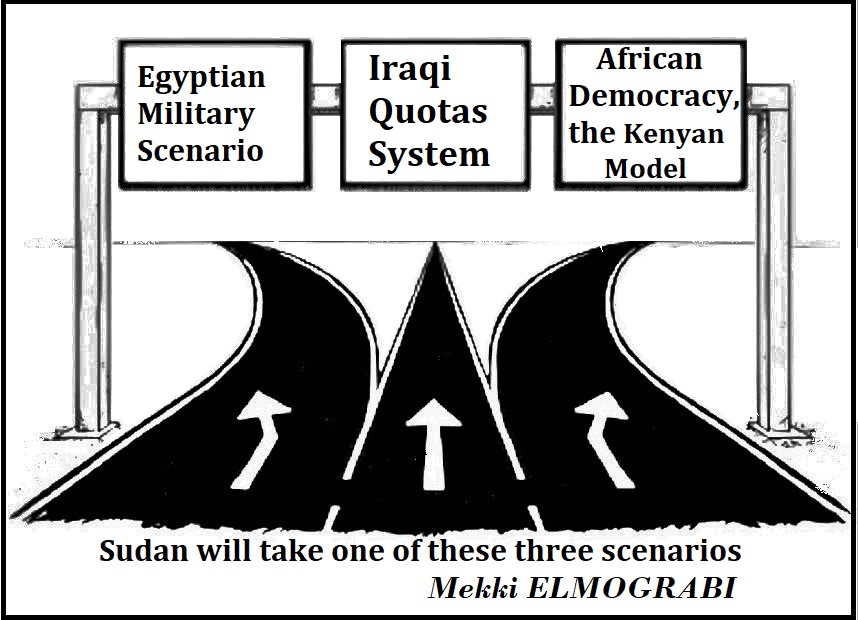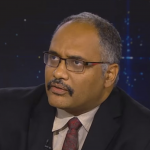
Three Possible Scenarios for Sudan to Avoid War and Division
Egyptian Military Scenario, Iraqi Democratic quotas system, or African democracy; nearest example is Kenya.

Mekki ElMograbi – Khartoum
Most expectations in Sudan before the falling of Bashir’s regime (1989-2019) were reduced to either one of two options; either successful change drives to real democracy or chaos drives to Yemeni or Libyan scenarios.
In reality, what had happened is most likely to drive the country to one of other three scenarios.
During my service in Washington D.C. as a media attaché for Sudan Embassy, I was very famous among US-Africa group for saying; “ruling Sudan is not easy at all!
“In some countries, you need a little experience and some skills. In Sudan, you need a full package of good experiences and advanced political and social skills, and that is might not enough for success but only to analyze the political situation in Sudan correctly”.
I started “US-Africa bridge” as a WhatsApp group for diplomats and journalists, then it took up a “meet up” style.
I am very thankful for members who still have the audio message in which I said three years ago, “the current regime in Sudan is not ideal but I am afraid other available alternatives are not fitting the bill, they are good but the challenge of ruling Sudan is bigger than them.”
After two years of change, I found most of them asking me again; why is ruling Sudan so difficult?
According to logical standards, the civil government after the change, headed by Dr. Abdalla Hamadok, is excellent, but according to what Sudan really needs, they are less than required criteria.
After the change, the new government wasted a year’s time in risky juggling between socialism and free economy, trying to do something and say another thing to its people.
They also spent precious time thinking about the “egg and chicken question”; which comes first, peace, democracy, or economic reforms?
The government delayed economic reforms to achieve incomplete peace deals, then, and just recently, started work on the reforms. I wrote an article on that.
Now, Sudan became open to many scenarios, but I think one of these three scenarios or a mixture of two could be more possible.
First scenario: the Egyptian model.
The military takes over the political arena not to rule but to lead the country to well-prepared elections.
The justification, in the Sudanese case, is based on fears of conflicts or a new wave of revolutions because of the economic situation.
Here is the problem! Making Abd AL-Fattah Al-Burhan a Sudanese version of Abd AL-Fattah Al-Sisi seems to be the safest scenario for a considerable number of observers.
Although both leaders came after an Islamist period, there are big differences between the two men and also between Sudan and Egypt regarding the power of Islamists and Islamic orientation.
In Sudan, there is partisan political life, the state/the government is not that strong as in Egypt. In short, it is just like playing soccer with the rules of American football and with players who do not know both games.
It could be helpful to learn from the Egyptian experience some lessons and to be realistic in giving the military a real political role but no way for a copy-paste from Sisi to Burhan.
Second scenario: the Iraqi settlement or sectarian quota system, modified in Sudan to “ethnic and political quotas system”
Who can say Iraq is not a stable country now? Political fragility in Iraq is better than endless chaos in Yemen and Libya. The Baa’th regime in Iraq was strong but accused of – same as Bashir’s regime – ethnic bias and ideological extremism.
The country went through wars for long time like Sudan. The Kurdistan issue is similar to Darfur and the two areas; the Blue Nile and South Kurdofan.
If the military is marginalized in favor of giving the upper hand to the civil side, divided political factions and armed movements, and all these components put under UN umbrella sponsored western influence, then an Africanized model of Iraq will be launched.
Third scenario: the African Kenyan Model; Democracy in this East African nation not ideal but still praised by western countries/international community.
Kenya is considered as an African model of democracy that could not put an end to ethnic division, violence, and corruption, but is the best in its region.
Sudan cannot take the Kenyan path unless the National Army, the Rapid Support Forces, and armed movements merge into one army.
The democratic elections will be marred with ethnic violence and the ICC will be part of the scene because of the need for judicial settlement and transitional justice.
Sudan has finally taken the path of free economy like Kenya; the only step needed is unifying the army.
Conclusion
I believe, if the future of Sudan decided by Sudanese, the Kenyan model is the most possible scenario.
However, with direct UN intervention and strong polarization, the Iraqi model will be applicable.
With a successful and a very real military-civil compromise, the Egyptian model will be possible.
Mekki ElMograbi is a press writer on African affairs. He can be reached through his email (elmograbi@gmail.com) or his contact number +249912139350 (Whatsapp and Telegram)




